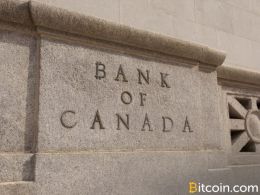
Bank of Canada calls central bank digital currencies risky, especially storage
Is risk in the eye of the beholder? Canada's central bank, the Bank of Canada, recently put out a report on the risks and benefits of a central bank digital currency. "An anonymous token-based central bank digital currency (CBDC) would pose particular security risks," the Bank of Canada wrote in its Oct. 5 report. "These risks arise from how balances are aggregated and stored, how CBDC is used for transactions, and how various solutions such as e-wallets, crypto exchanges and banks compete to attract users."Over the past year or so, discussions have picked up and various governments have....
Related News
The Bank of Canada has been heavily researching blockchain technology, Bitcoin, and the use of digital currencies. Just recently, a team of central bank researchers published a report called “Canadian Bank Notes and Dominion Notes: Lessons for Digital Currencies” examining issues they believe revolve around private and public cryptocurrencies. Is....
Canada’s central bank, the Bank of Canada, and five other Canadian banks (like a growing number of banks around the world) are experimenting with blockchain technology and a possible digital dollar as the growing demand for digital fintech payment systems puts the squeeze on the traditional banking sector. At a recent IMF/World Bank conference hosted by the U.S. Federal Reserve, an estimated 90 central banks, including the Bank of Canada, came forward to talk about their research into and experiments with distributed ledger technology (DLT), the blockchain and digital currencies. The big....
The move comes as the central bank continues to research how a central bank digital currency would work as well as the possible risks.
The Central Bank of the Republic of Armenia has advised its citizens not to use digital currencies such as bitcoin. The Armenian central bank told regional news service ARKA last month that, in its view, the use of digital currencies should be avoided due to a lack of regulation in the industry. The comments appear to be some of the first from the institution on the technology. The central bank told ARKA: "According to Armenian legislation, virtual currencies, including bitcoins are not considered electronic money. This in view, the regulator calls on citizens to refrain from using them,....
The Bank of Canada has joined the list of bank-related institutions to commission research papers regarding the use of digital currencies, particularly Bitcoin. Its two authors came up with an economic framework to analyze their exchange rates. Blockchain as a challenge for central banks. The Bank of England had earlier released a research paper that studied the macroeconomic consequences of issuing central bank digital currency (CBDC). The 2015 paper by the Bank for International Settlements noted that the emergence of distributed ledger technology could present a hypothetical challenge....





